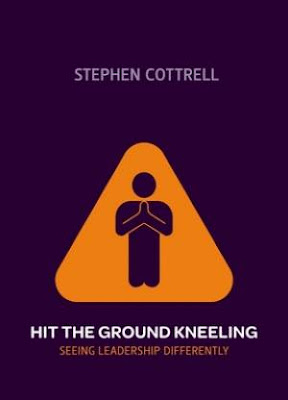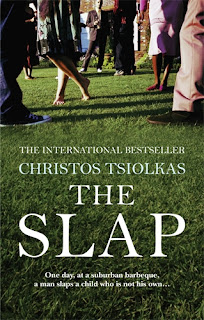Have just read the first two Jack Reacher novels. They’re good. They’re readable. The writer likes short sentences. He has to keep things moving. There will be gunfights. The hero will fall in love. And the hero moves on in the end.
Category Archives: book review
Blink (Malcolm Gladwell)
Excellent, highly recommended.
I now want to write blogposts about global warming, on the having of too many opinions, and why Sarah Palin will make an excellent President.
Maybe later…
The Slap – Christos Tsiolkas
Jane Austen, with added pornography.
Let me expand slightly on that: a very interesting portrait of a small group of middle-aged, middle-class parents, and the consequences upon their lives when one of their number slaps the child of another. I might have wished for a little less crudity, but it was an absorbing read, and it raises some important issues into the light. Recommended.
Against the Machine (Lee Siegel)

One of the common tropes of Modern fictional stories (novels and films) is the way in which technology enslaves and harms its creator – think of anything from HAL to the Terminator for an example, but the origins go back to Faust and Frankenstein – and this awareness in literature is not without real life application – just consider the words Bhopal, or Chernobyl, or, more recently, Deepwater Horizon. A new technological development like the internet is bound to give rise to questions about whether it will prove to be harmful for humanity. This is Lee Siegel’s thesis in ‘Against the Machine’.
Let’s start with some good points: Siegel can write well, with an arresting turn of phrase, “they were learning how to perform their privacy” (of bloggers), “If a Bach fugue went to sleep and dreamed of being another form of communication, it would be the Web”. He also has a point about the endemic narcissism that is so prevalent on the internet although his list of criticisms of blogging is rather overblown – “just fifteen years ago, blogospheric excesses would have been considered a democratic crisis”. Hmm.
Early in the book, Siegel talks about the difference between being in Starbucks with a notebook, and engaging with the wider world, and being in Starbucks with a laptop, and criticises the latter as a “social space [that] has been contracted into isolated points of wanting, all locked into separate phases of inwardness”. The web, and the ubiquity of the culture associated with it, has destroyed community!
Well, no. Siegel would have been fairer comparing the laptop user to someone reading a book – which is also an extremely effective tool for cutting off human contact and distorting ‘normal’ patterns of human association. At the moment I am particularly delighted that my eldest has been bitten by the book bug, and can now be found at all moments of the day with his nose deep in a Bewilderwood book.
Scratching the surface of this book just a little, we find a journalist who had a bad experience with the web and who is now working out his anger. A particular target is Kevin Kelly (and here I declare an interest, as I have followed Kelly’s blog with great interest and benefit for a number of years now). It is a cry of anguish about the decline of one medium which the author finds congenial, and against a medium that he blames for all that has gone wrong in (his life) society.
There are some useful points in this book – enough to make a good long magazine article – but the book as a whole is lightweight and underwhelming. It didn’t help that he misuses Wittgenstein (grin). Not recommended.
Ghost (Robert Harris)
Got this to read because I saw the trailer for the movie, and thought it looked intriguing. Fascinating plot – and consideration of what ghost-writing involves – and a satisfying ending, albeit a little predictable. At some stage I’ll have to do a rant on attitudes to the Iraq war, but not today.
Hit the ground kneeling (Stephen Cottrell)

When it was announced that Stephen Cottrell was coming to be our Diocesan Bishop, I thought I’d best read a couple of books by him to get a flavour of his thinking. I enjoyed this, and thought it rather sound, albeit also extremely short (it’s meant to be read slowly I guess). Much of the ‘wisdom’ I was familiar with, but as always the real challenge is turning right knowledge into right action. I’ll get there.
Blood Work/ Void Moon (Michael Connelly)
Read these on holiday. Two more excellent books, largely independent of the Bosch series, which stand on their own and would make for great films. Actually, I think one of them has been! I’ll have to track down a copy…
I’ve read a lot of Morse novels this year too (had the complete set given to me for Christmas) and whilst I love them, and the remembrance of Oxford which they provoke, I find a US setting more relaxing, precisely because it is more foreign.
Hit the ground kneeling (Stephen Cottrell)

When it was announced that Stephen Cottrell was coming to be our Diocesan Bishop, I thought I’d best read a couple of books by him to get a flavour of his thinking. I enjoyed this, and thought it rather sound, albeit also extremely short (it’s meant to be read slowly I guess). Much of the ‘wisdom’ I was familiar with, but as always the real challenge is turning right knowledge into right action. I’ll get there.
Bad Science (Ben Goldacre)
Thoroughly splendid and highly recommended – except for the ration of anti-Christian prejudice. I do occasionally daydream about doing an A Level in Maths and Statistics (now there is a sad admission!)
High Concept (Charles Fleming)
This is a very bad book. Quite possibly the worst book I’ve read in the last ten years. The author had an interesting idea – explore the notorious life of Don Simpson and use Simpson as the lens through which to focus on the corrupt nature of Hollywood – but there is so much name dropping, and filler extracted from magazine articles, that the image presented is irrevocably blurred.
How about this for a sentence: “The Hollywood that Simpson left behind was provincial, incestuous and almost hermeneutic in its isolation from the outside world and ordinary human reality.” Now I think that Fleming meant ‘hermetic’ in that sentence, which would seem to fit, but his writing is so sloppy (and badly edited) that I simply cannot be sure he wasn’t genuinely thinking of ‘hermeneutic’ and just got the rest of the sentence mangled.
Some eye-popping details, but not recommened. Read a long review instead.

